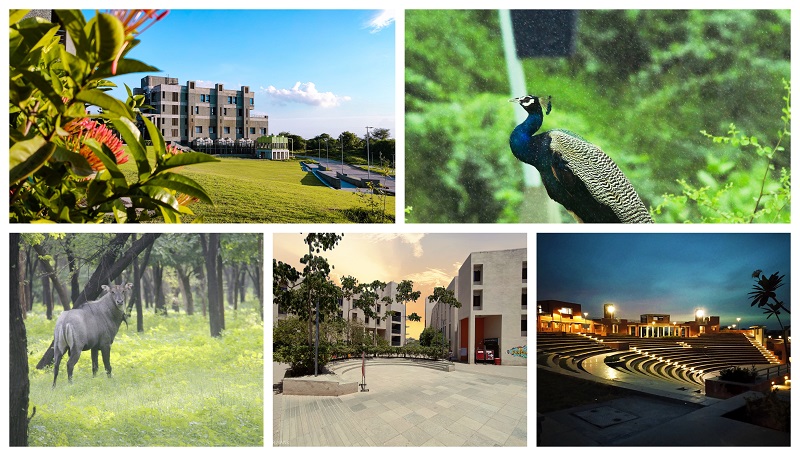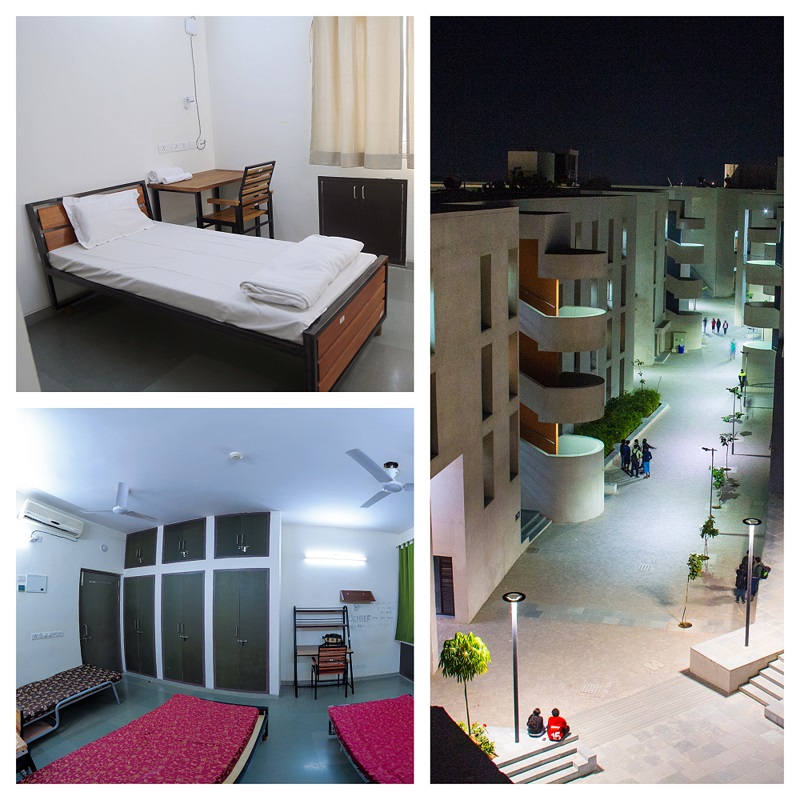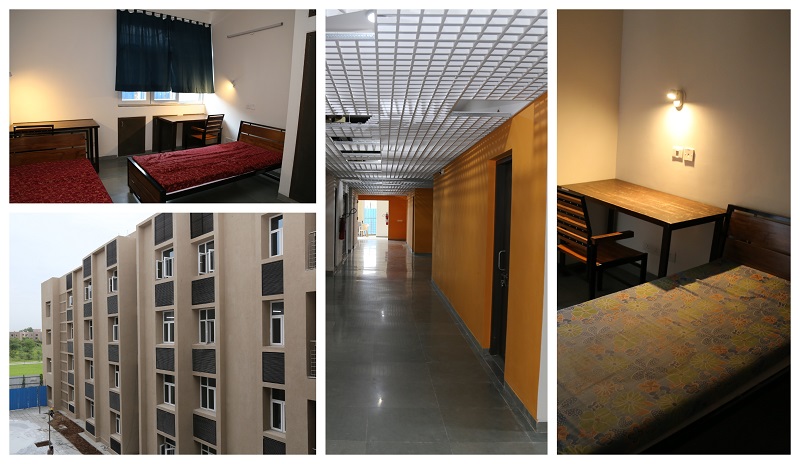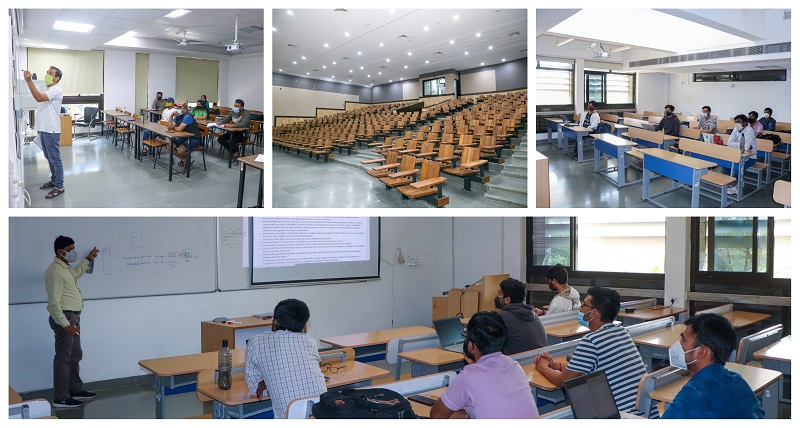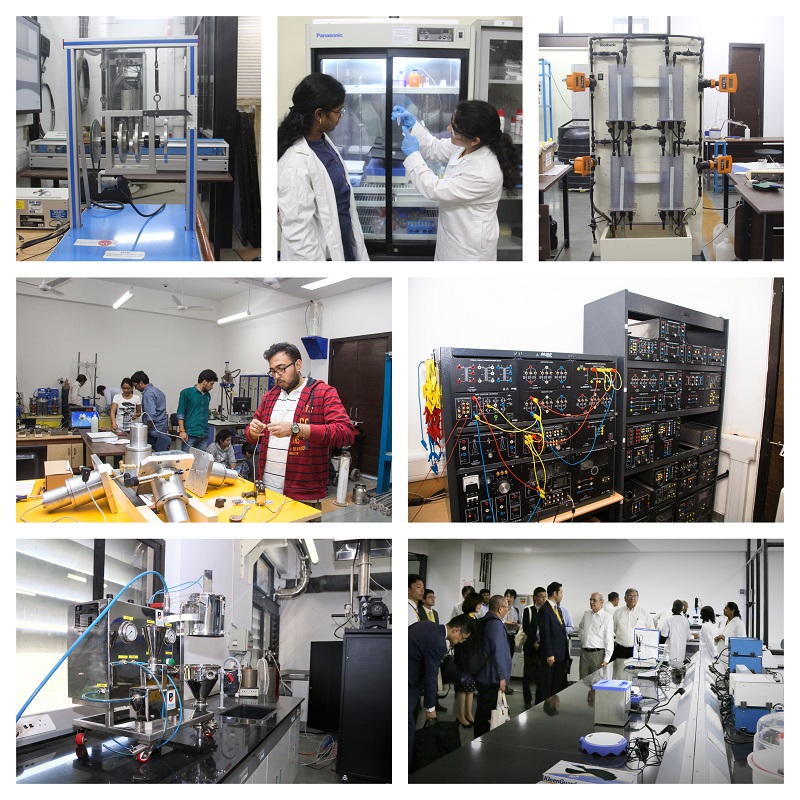
International Students
IIT Gandhinagar (IITGN) welcomes students from around the world to join a vibrant academic community committed to excellence in education, research, and innovation. Situated on the serene banks of the Sabarmati River in Gujarat, India, IITGN offers an interdisciplinary and inclusive environment that fosters global perspectives and cross-cultural learning.
We encourage you to explore this webpage and discover the opportunities that IITGN offers.
-
Why Choose IITGN?
Why Choose IITGN?
IIT Gandhinagar is a vibrant, forward-looking academic institution committed to delivering a world-class education. Our vision is to reimagine education by creating a thriving academic space where ideas flourish, disciplines connect, and innovation drives change.
Our academic structure is built for flexibility and creativity, enabling students to work across fields, ask bold questions, and develop solutions for real-world problems. At IITGN, you will be immersed in a culture that values experimentation, critical inquiry, and global collaboration.
With strong ties to industry and academic institutions around the world, IITGN offers international students opportunities to learn from the best, collaborate across cultures, and engage with real-world challenges. You will learn alongside a diverse and dynamic student community, mentored by some of India’s most accomplished faculty.
As IITGN steadily emerges as one of India’s leading destinations for high-quality education and cutting-edge research, we welcome you to join our community and help shape the future. -
Programs
Programs
IITGN offers a range of postgraduate (Master’s) and doctoral (PhD) programs across engineering, sciences, humanities, and social sciences. With a focus on interdisciplinary learning, cutting-edge research, and personalised mentorship, these programs nurture critical thinking and meet global academic and research standards.
1. Master’s Degree Programs (M.Tech, M.Sc., MA)
Our Master’s programs are designed to provide advanced knowledge and hands-on experience in specialised fields. The programs typically involve a combination of coursework, project work, and independent research, preparing students for professional careers or further doctoral study. International students can choose from the following options:
-
M.Tech Programs:
- Biological Engineering
- Chemical Engineering
- Civil Engineering
- Computer Science and Engineering
- Artificial Intelligence
- Earth System Science
- Electrical Engineering
- Integrated Circuit Design and Technology
- Mechanical Engineering
- Materials Engineering
#Note: The MTech curriculum includes a mandatory two-semester research component, providing students with in-depth research experience alongside their coursework.
-
M.Sc. Programs:
- Physics
- Chemistry
- Mathematics
- Cognitive Science
-
M.A. Program:
- Society and Culture
2. Ph.D. Programs
Our Ph.D. programs provide an excellent opportunity for international students to work on advanced research topics under the mentorship of experienced faculty members. The programs emphasise interdisciplinary approaches, global collaborations, and industry engagement.
Research areas include, but are not limited to:
- Engineering: All major branches such as Biological, Chemical, Civil, Computer Science, Artificial Intelligence, Electrical, Earth System Science, Materials, and Mechanical Engineering.
- Sciences: Basic and applied sciences, including Physics, Chemistry, Mathematics, Cognitive and Brain Sciences
- Humanities and Social Sciences: Interdisciplinary research in Philosophy, Political Science, Sociology, Psychology, South Asian Studies, Ancient and Medieval India, Literature, etc.
General information about the PhD program and its requirements can be found here.
-
-
Research @ IITGN
Research @ IITGN
At IITGN, research is central to our mission of advancing knowledge and creating impact. International students who join IITGN as postgraduate or doctoral scholars become part of a thriving research community that values curiosity, innovation, and collaboration across disciplines.
Our research ecosystem spans various fields — from engineering and technology to sciences, humanities, and social sciences. Faculty and students work on cutting-edge problems that address real-world challenges, often through interdisciplinary and globally connected projects.Visit our Research Page to learn about IITGN’s research and development activities
-
Research Facilities
With advanced laboratories, specialised centres of excellence, high-performance computing, and maker spaces, the campus is built to support innovation across science, engineering, humanities, and design. In addition to advanced equipment, students can access state-of-the-art maker spaces, tinkering labs, and mentorship across disciplines. Explore the research facilities, Maker Bhavan, Tinkerer’s Lab, and Supercomputing facility.
-
Library Resources
The IITGN Library is a vibrant hub of learning and discovery, offering a vast collection of books, journals, digital resources, and research databases across disciplines. Designed for comfort and quiet focus, it features collaborative study spaces, tech-enabled reading rooms, and 24/7 access to online materials. Visit the Library.
-
-
Admission Procedure
Admission Procedure
Who can apply?
Through our international admissions program, we invite foreign students from all backgrounds to apply for a full-time postgraduate program through this page. Please note that Indian passport holders, regardless of their country of residence, as well as Persons of Indian Origin (PIO) and Overseas Citizens of India (OCI) must apply through IITGN’s regular admissions process.
Additionally, all international applicants are required to first register on the Study in India (SII) portal (https://studyinindia.gov.in/) and obtain a 15-digit SII Unique ID before submitting their application on the IITGN admissions portal.
Program Fees and Financial Support
1. Program Fees
One-time Fees
- Admission Fee: USD 500
- Security Deposit: INR 9,360 (refundable upon graduation)
Costs per Semester
For students from SAARC countries (Afghanistan, Bangladesh, Bhutan, India, the Maldives, Nepal, Pakistan, and Sri Lanka)
- Tuition Fee: USD 1,000
- Other Costs (including food, accommodation, laundry, and miscellaneous expenses): approximately INR 54,860
The fee above is subject to change from time to time
For students from non-SAARC countries
- Tuition Fee: USD 2,000
- Other Costs (including food, accommodation, laundry, and miscellaneous expenses): approximately INR 54,860
The fee above is subject to change from time to time
2. Financial Support
International students enrolled at IIT Gandhinagar, regardless of the program, may be considered for financial support from the Institute.
-
• MTech Fellowship: For eligible students, the fellowship typically supports up to 80% of the nominal living expenses during the program.
-
• PhD Fellowship: Eligible students will receive fellowship support that covers more than 100% of the nominal living expenses, ensuring comprehensive financial assistance throughout their research program.
#Note: Fellowship will be awarded based on merit and financial need and assessed on a case-by-case basis.
Foreign Government Scholarships
Candidates sponsored by the government of their country of residence may submit their application documents independently or through the sponsoring authority. If found suitable, an admission offer letter will be issued either directly to the candidate or routed through the sponsor, as applicable.
If you are applying through a sponsoring authority, we recommend that you also complete our online admission form. In the "Additional Relevant Information" section, please mention that you are applying through a sponsoring body. Your online submission will be maintained for our records.
Application Process
#Note:
- All applications must be submitted online through [https://admissions.iitgn.ac.in/pginternational/login].
- If you wish to apply to more than one discipline, please submit a separate application for each.
- There is no application fee, and you do not need to send a hard copy of the form.
-
You can also use alternate platforms for submitting your application, such as:
- Indian Council for Cultural Relations (ICCR): https://www.iccr.gov.in/iccr-scholarship/%20indian-council-cultural-relations-scholarship
After Submission of Your Application
- Upon successful submission, a confirmation page will appear displaying your application number.
- Please save the PDF copy of your application for future reference.
- After an initial check for completeness, your application will be forwarded to the relevant discipline for review.
- If shortlisted, you will be invited for an interview and/or test conducted via phone or video conferencing.
- If selected, you will receive an official offer letter from the Institute.
- For any queries, feel free to contact us at Iso@iitgn.ac.in
Post-admission Information
Visa Requirements
- Students admitted to Master’s programs (M.Tech, M.Sc., M.A.) or Part-time Non-degree programs must apply for a Student Visa.
- Students admitted to the Ph.D. program must apply for a Research Visa.
Please apply for your visa at the nearest Indian Embassy or Consulate using your official offer letter from IIT Gandhinagar, along with any additional supporting documents. While IITGN will assist you with the required documentation, visa issuance is at the discretion of the Indian authorities and is beyond the control of the Institute.
Documents to Bring Upon Arrival
Upon joining, you must present the following original documents for verification:
- Official academic transcripts
- Degree certificates (if available)
- Other documents related to your educational qualifications or professional experience
If your degree certificate is not available at the time of joining, you must submit it within one year. Failure to do so may lead to cancellation of admission.
Housing
All international students are provided accommodation, either on-campus or off-campus apartments near the Institute. These are safe, comfortable, and designed to support a vibrant student community.
Health Insurance
While IIT Gandhinagar offers basic medical care on campus, it is mandatory for all international students to have valid health insurance coverage for the entire duration of their stay.
English Proficiency
English is the language of instruction at IIT Gandhinagar. All international applicants are expected to possess a basic level of English proficiency to successfully participate in academic and campus life.
-
Campus highlights
Campus highlights
IIT Gandhinagar (IITGN) offers a modern, fully residential campus designed to foster learning, creativity, and community living. Located on the banks of the Sabarmati River in Gujarat, India, our 400-acre campus is known for its vibrant environment, sustainable design, and world-class facilities.
International students at IITGN experience a safe, inclusive, and stimulating campus life that supports both academic and personal growth.- Sustainable Campus: IITGN is home to diverse flora and fauna, including over 100 species of birds and 18 species of butterflies, offering a tranquil and eco-conscious environment. Its energy-efficient buildings, open spaces, green tech, and efficient waste management systems contribute to a smart, eco-friendly campus environment.
Get a glimpse of IITGN - World-Class Facilities: Students have access to state-of-the-art laboratories, research centres, a central library with extensive digital resources, advanced sports infrastructure, and vibrant cultural spaces.
Take a virtual tour - Campus Life: IIT Gandhinagar offers a safe, modern, and student-friendly campus that prioritises well-being and holistic development. Students enjoy centrally air-conditioned hostels with shared amenities like lounges, music rooms, reading corners, and fully equipped pantries.
View the facilities - Student Life @ IITGN: With vibrant cultural events, student-led clubs, sports, and wellness programs, the campus fosters creativity, community, and personal growth.
Discover student life
Student Stories
- Sustainable Campus: IITGN is home to diverse flora and fauna, including over 100 species of birds and 18 species of butterflies, offering a tranquil and eco-conscious environment. Its energy-efficient buildings, open spaces, green tech, and efficient waste management systems contribute to a smart, eco-friendly campus environment.
-
IITGN Gallery

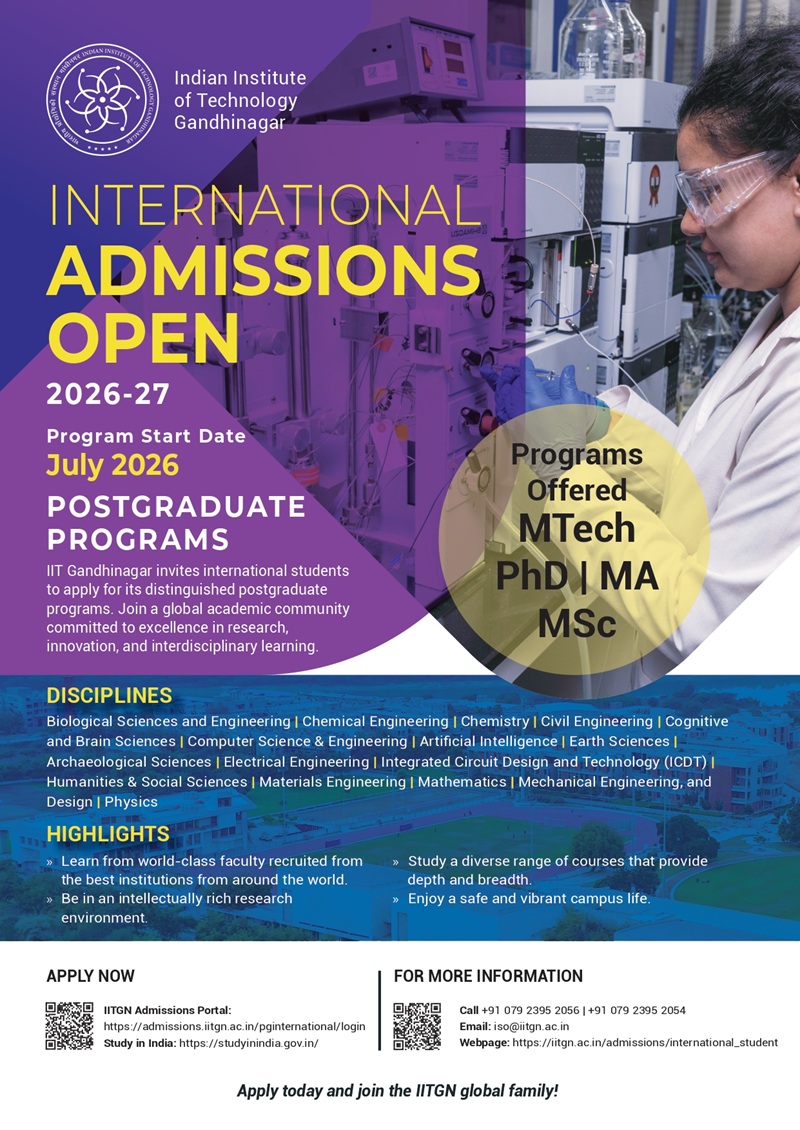









.jpg)
